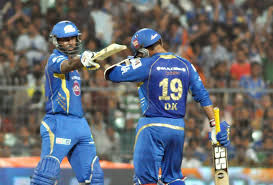
Kolkata, May 25: Mumbai Indians huffed and puffed their way to a four-wicket win over Rajasthan Royals in a thrilling match on Friday night to set up a summit showdown with Chennai Super Kings in the Pepsi Indian Premier League.
Chasing a stiff target of 166, Mumbai had a flying start with opener Dwayne Smith (62) once again coming good up front, before Rajasthan Royals bounced back with Kevon Cooper (2-33) striking in the middle.
Mumbai Indians almost choked in the middle yet again but some sensible batting by young Rishi Dhawan and Harbhajan Singh helped them pip Rajasthan.
It will thus be a repeat of the 2010 final which Mumbai lost.
There was a little twist in the tale when Royals took three wickets -- Karthik (22), Rohit Sharma (2) and the prized-scalp of Smith -- in successive overs to leave them at 132 for four in 16.3 overs.
But Pollard calmed the nerves with a first-ball six taking them closer to the target.
There was more drama in store when James Faulkner dismissed Pollard in the next over with 25 runs needed from 15 balls and with five wickets in hand.
With 23 needed from the last two overs, Rayudu hit Cooper for a six before being dropped by Brad Hodge, which proved to be the turning point of the game.
Rayudu hit a boundary in the next ball to make it an eight-run issue in the last over, which was again full of drama when Watson bowled the batsman with his second ball.
With six needed from four, young Rishi Dhawan, who was included in place of Munaf Patel, showed amazing calm in pressure situation as he walked across the crease before hitting a boundary with a scoop shot that almost settled the issue for Mumbai.
A target of 166 might look stiff from the Eden Gardens' context but Mumbai Indians approached it in a quiet yet effective manner with Tare and Smith giving them a flying start.
The Royals had to wait till the 12th over for their first and only six, but Mumbai Indians did not let the former settle down with Tare dispatching Faulkner over the boundary in the very second ball he faced.
The duo put on 50 runs in 43 balls with Tare taking the attack to the Rajasthan camp even as Smith rotated the strike.
If the bowlers struggled to get the breakthrough, fielders leaked runs in heap with misfields and overthrows adding to their plight.
On conditions best suited to the slow bowlers, Royals certainly missed a spinner as they had no one in their XI with both their frontline spinners -- Ajit Chandila and Ankeet Chavan -- behind the bars in connection with the spot-fixing scandal.
Royals did get a wicket when Kevon Cooper dismissed Tare but Mumbai Indians seemed to be in no trouble with Smith completing his half-century in 39 balls with a six off Faulkner.
Smith went about the proceedings with Dinesh Karthik -- the duo put on 55 from 30 balls, which took them 41 runs shy of the target with 35 balls remaining.
Smith hit six fours and two sixes during his 44-ball knock.
Earlier, a different-looking Rahul Dravid was a perfect blend of classic and contemporary as he led from the front with a gritty 43 from 37 balls. He hit seven delightful boundaries.
But Mumbai Indians did not let the Royals break free with Harbhajan Singh making full use of the overcast conditions, returning impressive figures of three for 23, which also included the prized scalp of Dravid.
Kieron Pollard took two wickets in one over to further damage Royals' scoring rate before Mumbai got their script wrong in a horrible final over.
Slinger Lasith Malinga was at his wayward best as he leaked 18 runs, including seven extras with two dreadful wides, as Dishant Yagnik (31) and Brad Hodge (19) added an unbroken 57-run partnership from 27 balls to post a fighting total on the sluggish surface.
At the start, an interesting duel was on display when Dravid took attacked quickie Mitchell Johnson with consecutive boundaries with some classical flicks and drives.
That Johnson had troubled Rahane with his rising bouncer hitting the young opener's helmet a while ago, must have frustrated the Aussie who conceded 23 runs from three overs and was even seen losing his cool with exchanges in the middle.
But the retired Indian batsman went about his way silently as his aggressive demeanour brought the otherwise downcast atmosphere alive.
Spinners got some help from the slow track aided by the overcast condition.
Ojha, who was introduced in the third over, troubled Dravid conceding just three runs from his first over.
But the veteran was quick to adjust himself in the next over as he took the aerial route that was enough to clear the 30-yard circle.
But the problem for Royals was that Dravid did not get any support at the other end after Harbhajan took Rahane (21) and Watson (6) in successive overs.
Just when the opening partnership was looking good, Rahane was castled behind his legs, while Watson had a sloppy dismissal.
Malinga gave Mumbai Indians the third breakthrough -- Sanju Samson (0) -- while Harbhajan had Dravid giving an easy catch at midwicket.
It was then Yagnik showed some fine intent to give a that push alongwith Hodge.





Comments
Add new comment